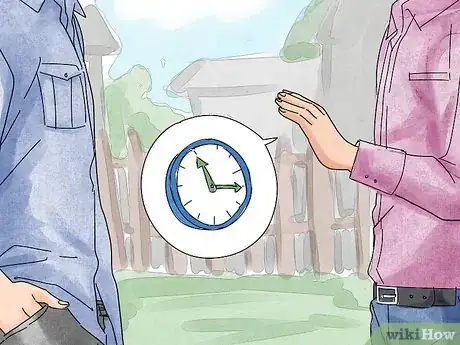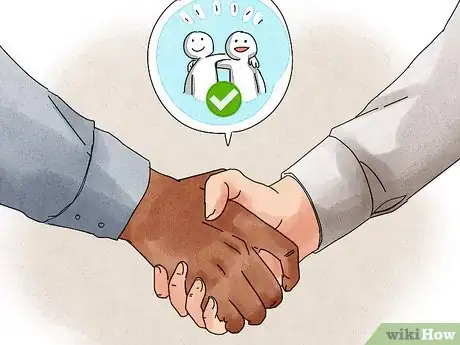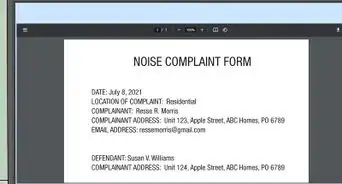This article was co-authored by Moshe Ratson, MFT, PCC. Moshe Ratson is the Executive Director of spiral2grow Marriage & Family Therapy, a coaching and therapy clinic in New York City. Moshe is an International Coach Federation accredited Professional Certified Coach (PCC). He received his MS in Marriage and Family Therapy from Iona College. Moshe is a clinical member of the American Association of Marriage and Family Therapy (AAMFT), and a member of the International Coach Federation (ICF).
This article has been viewed 47,632 times.
Getting into an argument with your neighbor can be a very difficult situation, but it is possible to work through it with care and tact. In order to resolve a neighborly dispute it may take a dollop of humility and you may be the one that has to make the first move. That being said, working through a dispute will benefit you and your neighbor and will create a more positive environment in the neighborhood.
Steps
Communicating with Your Neighbor
-
1Approach your neighbor directly. If you haven't confronted this person about the situation, you need to do that first. It is unlikely that a neighbor will walk over and forgive you. If you are seeking forgiveness you need to be direct and approach your neighbour about the situation.
- If you are nervous or uncomfortable communicating with your neighbor face-to-face you may want to write them a letter that details your position regarding the issue.[1]
-
2Ask your neighbor why they are upset. In order to fully understand the situation, you need to know exactly what happened that caused your neighbor to be angry or upset with you. An important part of seeking forgiveness is being able to empathize with the other party involved.[2] Once you understand why your neighbor is mad at you you will be able to begin coming up with solutions.
- You may say something like “I noticed that you have been distant lately, is there something bothering you? Did I do something wrong?”
Advertisement -
3Be honest.[3] Your neighbor will likely not forgive you if you lie to them about the situation or your involvement in the situation. You must be direct and honest when discussing the issue with your neighbor. Honesty is one way to take responsibility for your actions and is more likely to result in forgiveness than avoiding or lying to your neighbor about what happened.
- In many instances dishonesty can be recognized by others and may actually make the problem worse. [4]
-
4Don't argue. Be accepting and understanding of everything your neighbor has to say, even if he or she is not willing to listen to your side of the story. In this situation, you must try and see the issue from their perspective. Even if you believe that you did nothing wrong try and understand what they are feeling.
- If the dispute is the result of a misunderstanding or miscommunication make sure that you vocalize your position in a respectful and non-accusatory manner.
Taking Responsibility for Your Actions
-
1Accept vulnerability. In order to be forgiven, you need to understand and accept the role that your actions played in affecting others, particularly your neighbor. You need to think about the situation from your neighbors perspective and fully appreciate how your actions impacted them. [5]
- For example, if your neighbor is upset because your dog went to the bathroom on their lawn and you did not clean it up you need to understand that this may be seen as a sign of disrespect from the perspective of your neighbors.
-
2Sincerely apologize. Saying “I’m sorry” is not enough, and may even come across as insincere. In order to apologize in a meaningful way, it is important that you describe exactly what you are apologizing for and that you understand how this impacted your neighbor. [6]
- You may say “I apologize for playing my music too loud late at night and I am sorry that I kept you up on a weeknight.”
- Alternatively you could say “I understand that my music kept you up very late last night. I am sorry and I won’t let that happen again.”
-
3Ask for forgiveness. Sometimes it is helpful to ask for forgiveness after apologizing. Perhaps your neighbors do not know that you are seeking forgiveness or they did not think it was necessary to vocalize that they have forgiven you. If you want to be forgiven you should ask. [7]
- You could say “I am sorry that I trimmed the hedges without asking your permission. I understand that you like the added privacy they provide. Next time I will speak with you before trimming. Can you forgive me?”
Moving Forward
-
1Be patient.[8] Once you've had a long discussion with your neighbor and apologized for your actions it may take time for them to fully forgive you. They may need time to digest what was said and think about how they want to respond. It may take a few days or even a week before they are able to forgive you. [9]
- You may end the conversation by saying “I understand that you may not be able to forgive me right away. I just wanted to take the opportunity to explain to you how sorry I am.”
-
2Change your actions.[10] Once you have apologized for something it is important that you follow through with your apology and don’t make the same mistake again. This will help to rebuild trust with your neighbor. [11]
- For example, if your dog was going to the bathroom on your neighbor's lawn you need to ensure that the bad behaviour does not continue. Maybe you need to put up a fence or have your pet on a leash when they are outside.
-
3Rebuild your relationship. Once you have apologized for your actions it may be helpful to actively try and rebuild your relationship with your neighbor. It is not necessary to have a super close relationship with your neighbor, but it is a good idea to be amicable and on decent terms with them:
- Invite them over to socialize
- Be polite and say “hello” every time you see them
References
- ↑ https://www.gov.uk/how-to-resolve-neighbour-disputes/talk-to-your-neighbour
- ↑ Moshe Ratson, MFT, PCC. Marriage & Family Therapist. Expert Interview. 7 August 2019.
- ↑ Moshe Ratson, MFT, PCC. Marriage & Family Therapist. Expert Interview. 7 August 2019.
- ↑ http://www.skillsyouneed.com/ips/polite-vs-honest.html
- ↑ http://www.nytimes.com/2015/09/27/fashion/how-to-forgive-in-four-steps.html?_r=0
- ↑ http://www.nytimes.com/2015/09/27/fashion/how-to-forgive-in-four-steps.html?_r=0
- ↑ http://www.nytimes.com/2015/09/27/fashion/how-to-forgive-in-four-steps.html?_r=0
- ↑ Moshe Ratson, MFT, PCC. Marriage & Family Therapist. Expert Interview. 7 August 2019.
- ↑ https://www.mindtools.com/pages/article/how-to-apologize.htm
- ↑ Moshe Ratson, MFT, PCC. Marriage & Family Therapist. Expert Interview. 7 August 2019.
- ↑ https://www.mindtools.com/pages/article/how-to-apologize.htm



































































